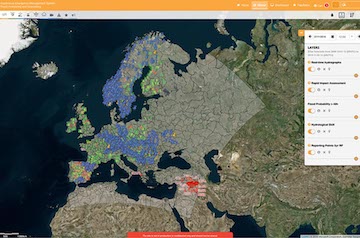The EFAS hydrological data archive can be accessed through different channels. The data can be accessed directly through ECMWF’s MARS archive. You can also go through the Copernicus Climate Data Store (CDS). If you are interested in only the water balance runs, the data can be downloaded directly.
Types of data
The data can be broadly categorised into observational data, analysis and forecasts. The observations are gridded files of temperature and observations used for running EFAS. The forecasts are operational forecasts, including seasonal forecasts and hindcasts. The analysis are the water balance runs using gridded observations as forcing. The latter also includes the fillup, which a proxy run using the latest forecast instead of observations in order to fill the gap between the latest available observations and forecasts.
What kind of data do you need?
The gateway to the data depends on your needs. If you are interested in specific data for the whole domain or a large subset of it, for example for research projects, you can get this through the MARS or CDS archives. If you need specific information and want to manipulate the data, it is recommended that you go through CDS. If you are only interested in discharge from the water balance run, you can use the direct download facility.
If you are looking for real-time forecast data, we recommend that you use the Web services.
MARS archive
The Meteorological Archival and Retrieval System (MARS) is the main repository of meteorological data at ECMWF. It contains petabytes of operational and research data, as well as data from Special Projects. Read the MARS documentation for more information.
Users can browse the Archive catalogue (describing archive data that ECMWF can distribute) or the complete MARS catalogue (authorization required) from our dedicated server. Please see also how to retrieve data with our WebAPI.
Copernicus Climate Data Store
The CDS is an easy-access archive for all kinds of climate data. The EFAS and GlOFAS data will be made available as raw output. You will also be able to manipulate the data using the toolbox to retrieve the specific information you need. The DCS is planned to go live in 2018.
Direct download
Here you can download discharge from the the EFAS water balance run (TBA).

